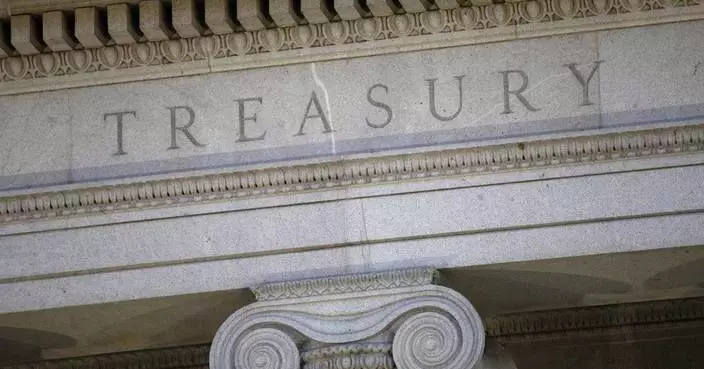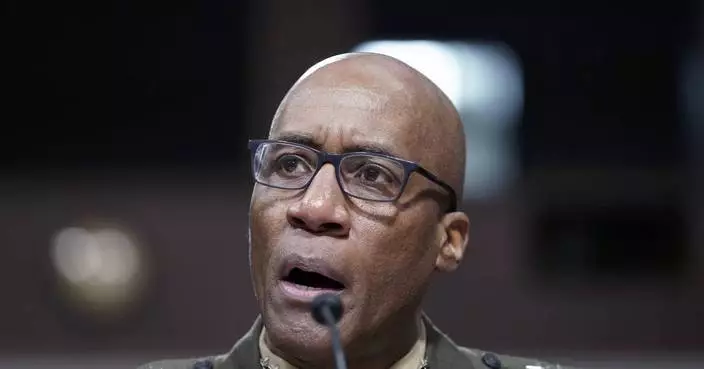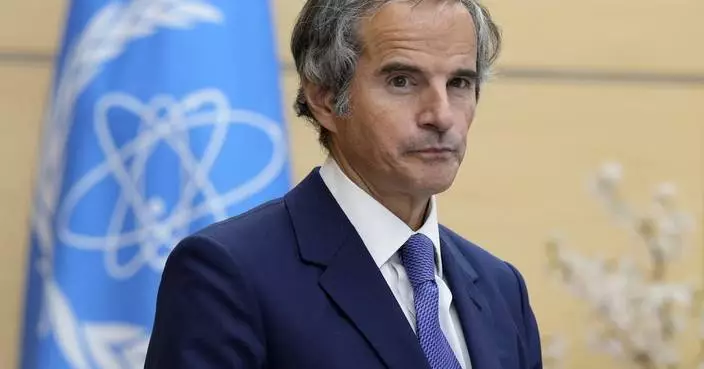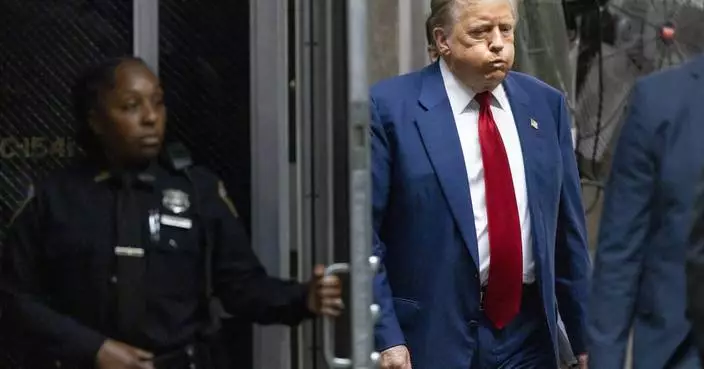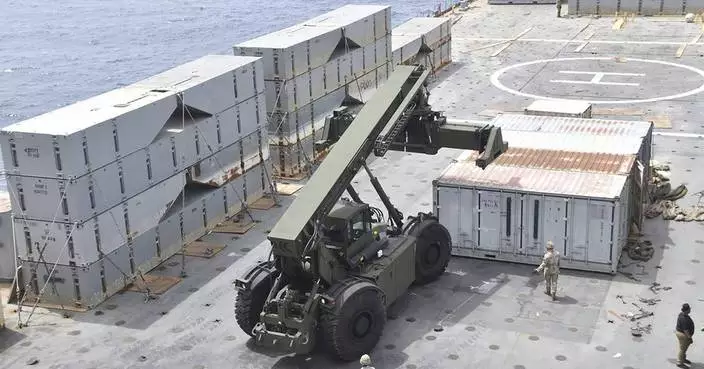North Korea on Wednesday called U.S. President Donald Trump's decision to relist it as a state sponsor of terrorism a "serious provocation" that justifies its development of nuclear weapons.
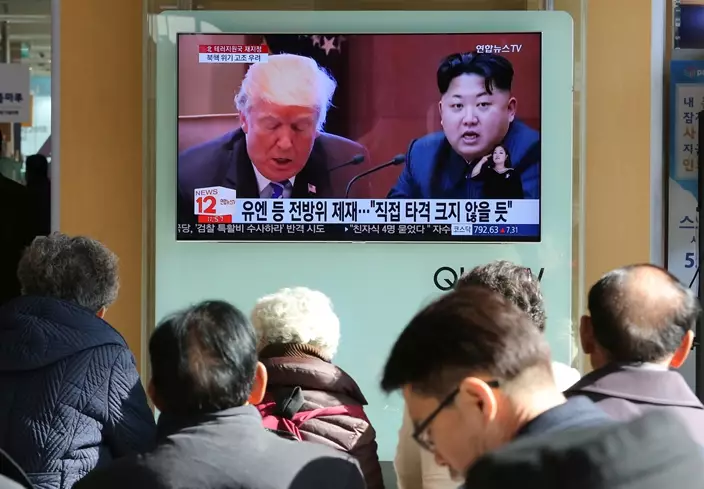
FILE- In this Tuesday, Nov. 21, 2017, file photo, people watch a TV screen showing images of U.S. President Donald Trump, left, and North Korean leader Kim Jong Un at Seoul Railway Station in Seoul, South Korea. (AP Photo/Ahn Young-joon, File)
In the country's first public response to its return to the American blacklist, the official Korean Central News Agency said North Korea has no connection to terrorism and does not care "whether the U.S. puts a cap of 'terrorism' on us or not."
It said the U.S. action shows North Korea should continue to "keep the treasured nuclear sword in our hands more tightly" to protect itself from American hostility.
"By re-listing (North Korea) as a 'state sponsor of terrorism,' the U.S. openly revealed to the whole world its intention to destroy our ideology and system by using all kinds of means and methods," the agency said, attributing the comments to an unidentified spokesman at North Korea's Foreign Ministry.
"Our army and people are full of rage and anger toward the heinous gangsters who dared to put the name of our sacred country in this wretched list of 'terrorism' and are hardening their will to settle all accounts with those gangsters at any time in any way," it said.
KCNA later published a separate statement attributed to a spokesman of the Korea Asia-Pacific Peace Committee, a North Korean state organization, which said the move by "old lunatic Trump" has caused the North Korean army and people to explode in "hate and spirit to destroy the enemy."
Experts say the U.S. decision to put North Korea back on its terrorism blacklist will have limited practical effect, but may make a diplomatic solution of the standoff over its nuclear weapons program more difficult. A day after placing North Korea back on the list, the Trump administration on Tuesday imposed new sanctions on a slew of North Korean shipping firms and Chinese trading companies in an effort to increase pressure on North Korea over its nuclear program and deprive it of foreign revenue.
North Korea has been accelerating its pursuit of nuclear weapons capable of targeting the United States and its Asian allies. In recent months, the North conducted its most powerful nuclear test yet and tested a pair of intercontinental ballistic missiles that could potentially reach the U.S. mainland if perfected. The country also fired powerful new midrange missiles over Japan and threatened to fire the same weapons toward Guam, a U.S. Pacific territory and military hub.
The United States has responded by dispatching strategic assets, including aircraft carriers and long-range bombers, more frequently to the region for patrols or drills.
UNITED NATIONS (AP) — Russia has circulated a U.N. resolution calling on all countries to take urgent action to prevent putting weapons in outer space “for all time” a week after it vetoed a U.S.-Japan resolution to stop an arms race in space.
The Russian draft resolution, obtained Wednesday by The Associated Press, goes further than the U.S.-Japan proposal, not only calling for efforts to stop weapons from being deployed in outer space but for preventing “the threat or use of force in outer space,” also “for all time.”
It says this should include deploying weapons “from space against Earth, and from Earth against objects in outer space.”
Russia’s U.N. Ambassador Vassily Nebenzia told the Security Council when he vetoed the U,S.-Japan draft that it didn’t go far enough in banning all types of weapons in space.
The vetoed resolution focused solely on weapons of mass destruction including nuclear arms, and made no mention of other weapons in space.
It would have called on all countries not to develop or deploy nuclear arms or other weapons of mass destruction in space, as banned under a 1967 international treaty that the U.S. and Russia ratified, and to agree to the need to verify compliance.
Before the U.S.-Japan resolution was put to a vote on April 24, Russia and China proposed an amendment that would call on all countries, especially those with space capabilities, “to prevent for all time the placement of weapons in outer space, and the threat of use of force in outer spaces.”
The vote was 7 countries in favor, 7 against, and one abstention and the amendment was defeated because it failed to get the minimum 9 “yes” votes in the 15-member Security Council required for adoption.
U.S. Ambassador Linda Thomas-Greenfield told the council after the vote that Russian President Vladimir Putin has said Moscow has no intention of deploying nuclear weapons in space.
“Today’s veto begs the question: Why? Why, if you are following the rules, would you not support a resolution that reaffirms them? What could you possibly be hiding,” she asked. “It’s baffling. And it’s a shame.”
Putin was responding to White House confirmation in February that Russia has obtained a “troubling” anti-satellite weapon capability, although such a weapon is not operational yet.
Russia’s U.N. Ambassador Vassily Nebenzia said after casting the veto that the U.S.-Japan resolution cherry picked weapons of mass destruction.
He said much of the U.S. and Japan’s actions become clear “if we recall that the U.S. and their allies announced some time ago plans to place weapons … in outer space.”
Nebenzia also accused the U.S. of blocking a Russian-Chinese proposal since 2008 for a treaty against putting weapons in outer space.
Thomas-Greenfield accused Russia of undermining global treaties to prevent the spread of nuclear weapons, irresponsibly invoking “dangerous nuclear rhetoric,” walking away from several of its arms control obligations, and refusing to engage “in substantive discussions around arms control or risk reduction.”
Much of the Russian draft resolution is exactly the same as the U.S.-Japan draft, including the language on preventing an arms race in space.
It calls on all countries, especially those with major space capabilities, “to contribute actively to the objective of the peaceful use of outer space and of the prevention of an arms race in outer space.”
Thomas-Greenfield said the world is just beginning to understand “the catastrophic ramifications of a nuclear explosion in space.”

FILE - U.S. Ambassador to United Nations Linda Thomas-Greenfield speaks on Thursday, April 18, 2024, in Tokyo. The U.N. Security Council is set to vote Wednesday, April 24, 2024, on a resolution announced by Thomas-Greenfield, calling on all nations to prevent a dangerous nuclear arms race in outer space. It is likely to be vetoed by Russia. (AP Photo/Eugene Hoshiko, Pool, File)





